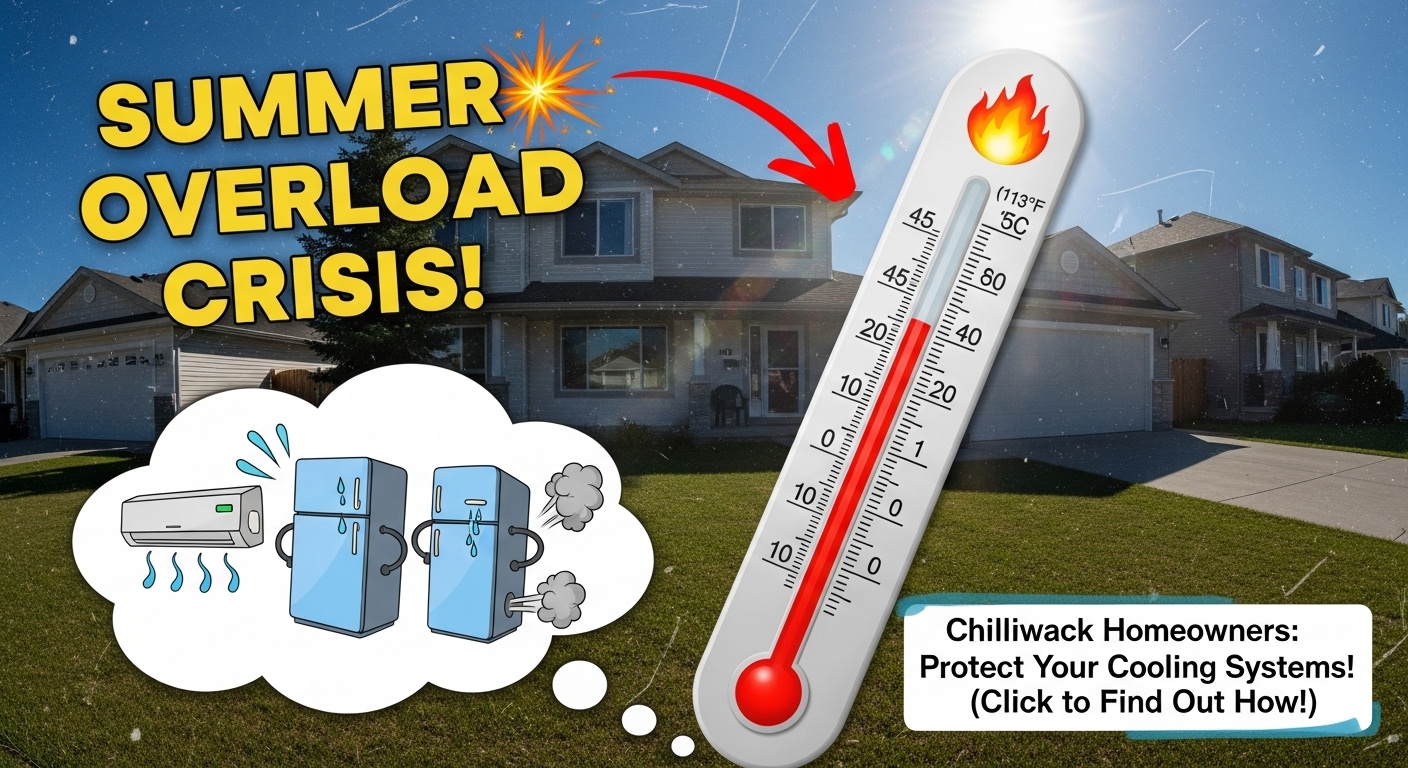Wondering why your air conditioner seems to run non-stop during heat waves or your refrigerator suddenly can’t keep milk cold despite working overtime? The reality is that summer heat waves create a perfect storm of appliance stress that pushes your cooling systems beyond their normal operating limits, often leading to expensive breakdowns just when you need them most. When summer arrives in Chiliwack and temperatures climb toward their seasonal peaks, the demand placed on household appliances intensifies dramatically. Refrigerators that normally cycle efficiently must run nearly continuously to maintain safe food storage temperatures, air conditioning systems strain to meet the cooling demands of increasingly unbearable heat, and freezers struggle against the rising ambient temperature to keep ice cream from melting. This phenomenon, which appliance professionals call “summer overload,” represents one of the most significant seasonal challenges facing homeowners in British Columbia’s Interior valley regions. The crisis becomes particularly acute during heat waves, when temperatures can exceed 35°C with minimal humidity relief, creating environmental conditions that push cooling systems to their absolute limits. Understanding how these appliances respond to extreme summer conditions and implementing protective strategies before the season peaks can mean the difference between reliable performance and costly emergency repairs that disrupt your summer plans and drain your household budget. The financial stakes are substantial – when multiple cooling systems fail simultaneously during peak heat, homeowners face repair bills that can easily exceed several thousand dollars, not including the cost of spoiled food and emergency accommodations.
Key Outtakes:
- Air conditioners running continuously during extreme heat are often performing normally, not malfunctioning, as they work to maintain temperature settings against overwhelming external conditions
- Refrigerator compressors face their greatest stress when exterior temperatures approach the appliance’s internal temperature settings, forcing motors to work overtime with minimal cooling efficiency
- Chiliwack’s unique valley climate creates rapid temperature transitions that can push appliances from normal operation to failure conditions within days
- Simple maintenance tasks like cleaning condenser coils can reduce energy consumption by 10-15% while dramatically lowering compressor failure risk
- Strategic appliance usage timing and thermostat management can reduce peak load stress more effectively than most homeowners realize
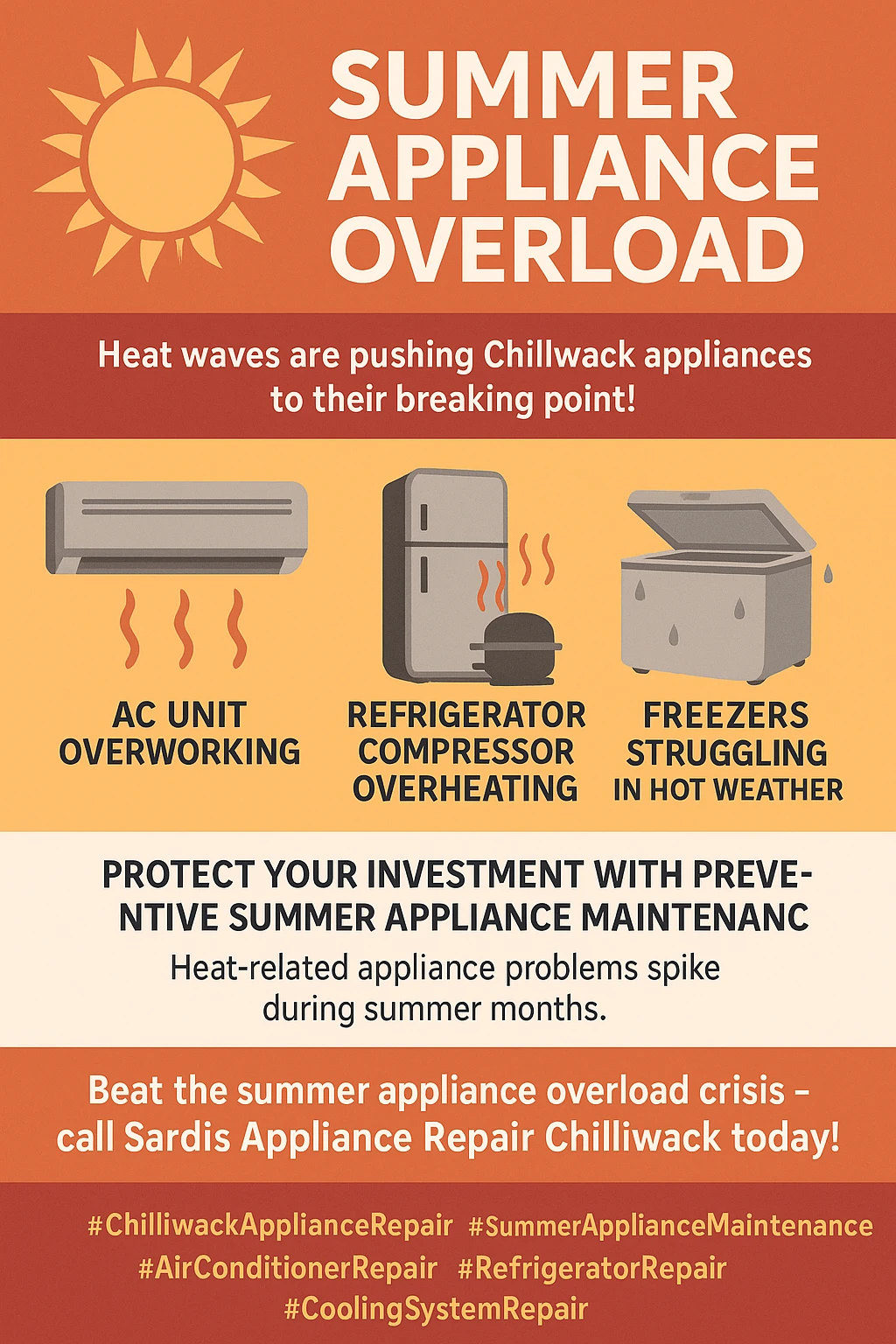
The Science Behind Summer Appliance Stress in Chiliwack
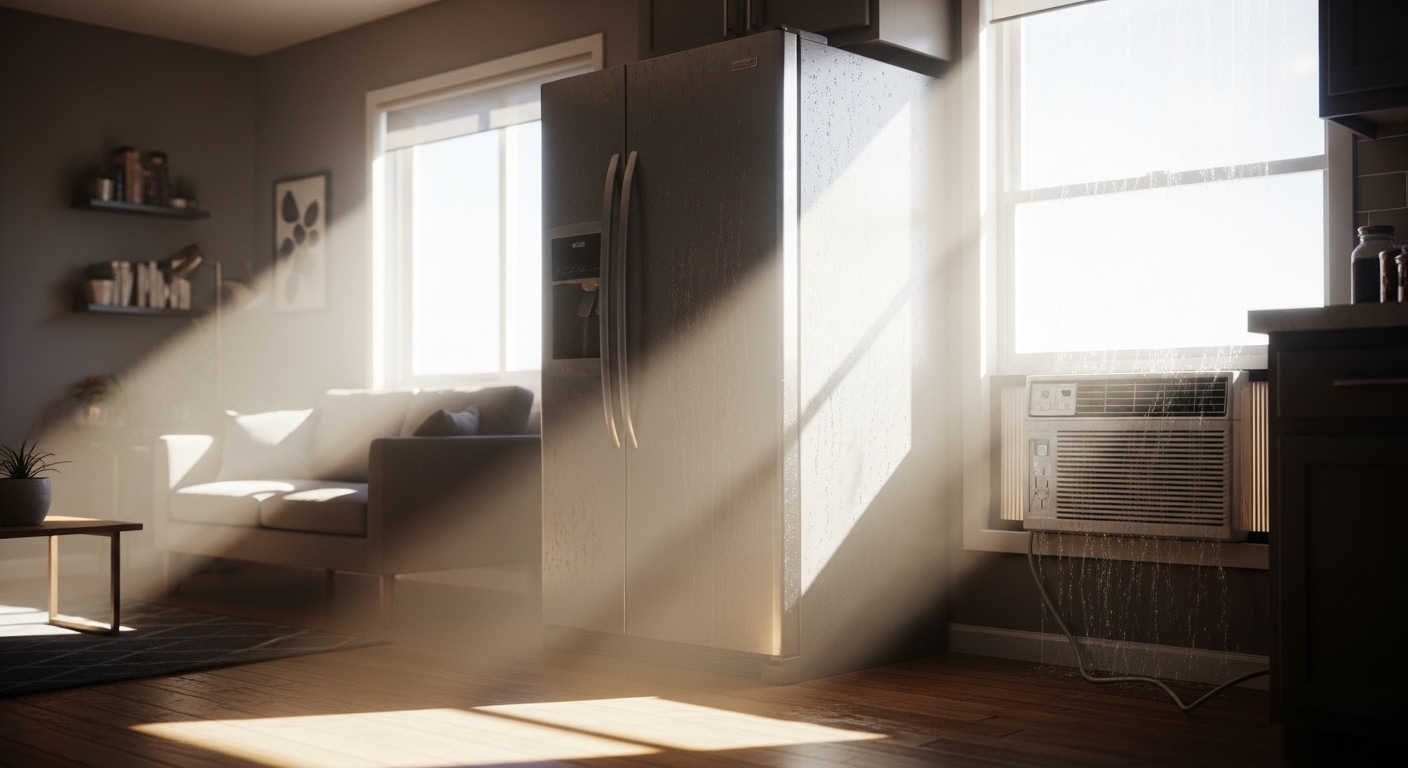
When exterior temperatures rise significantly, the fundamental thermodynamic principles governing cooling appliances change dramatically. Your refrigerator, freezer, and air conditioning system operate by transferring heat from an interior space to the exterior environment. As outside temperatures approach or exceed the temperature maintained inside these cooling devices, the efficiency of heat transfer decreases substantially. This phenomenon forces compressors and motors to work longer and harder, extending their operating cycles and increasing the workload on every internal component.
During extreme heat events, when outdoor temperatures can reach unprecedented levels with very low relative humidity as experienced in recent Chiliwack summers, the temperature differential necessary for efficient heat dissipation becomes dangerously small. The compressor, which sits at the heart of every refrigeration system, functions analogously to the human heart—it performs constant work to maintain desired temperatures. Under normal conditions, your refrigerator’s compressor might cycle on and off periodically throughout the day.
However, during summer heat waves, the compressor often runs almost continuously, attempting to maintain internal temperatures against the relentless external heat. This extended operation generates tremendous stress on the compressor’s motor, bearings, and all associated mechanical components. When air conditioning units face triple-digit temperatures, they experience similar strain, with their compressors running so frequently that many homeowners worry their systems have malfunctioned when, in fact, they are simply working at maximum capacity.
Beyond the simple increase in runtime, extreme summer heat creates several compounding problems within cooling systems. Motors that run continuously generate significant heat themselves, which then compounds the challenge of keeping cool air flowing through the system. Additionally, the refrigerant that circulates through these systems becomes stressed when required to cycle repeatedly under maximum load conditions. In extreme cases, refrigerant leaks can develop or existing marginal leaks can worsen as pressure builds within the system.
Electrical components, capacitors, and relays that coordinate the system’s operation all face increased strain when handling sustained high-load operation throughout extended hot periods. For Chiliwack homeowners, understanding that their appliances are fighting an uphill battle against geography and climate helps explain why cooling systems that worked perfectly in spring suddenly seem inadequate when summer heat arrives with full intensity.
Refrigeration Systems in Crisis During Heat Waves
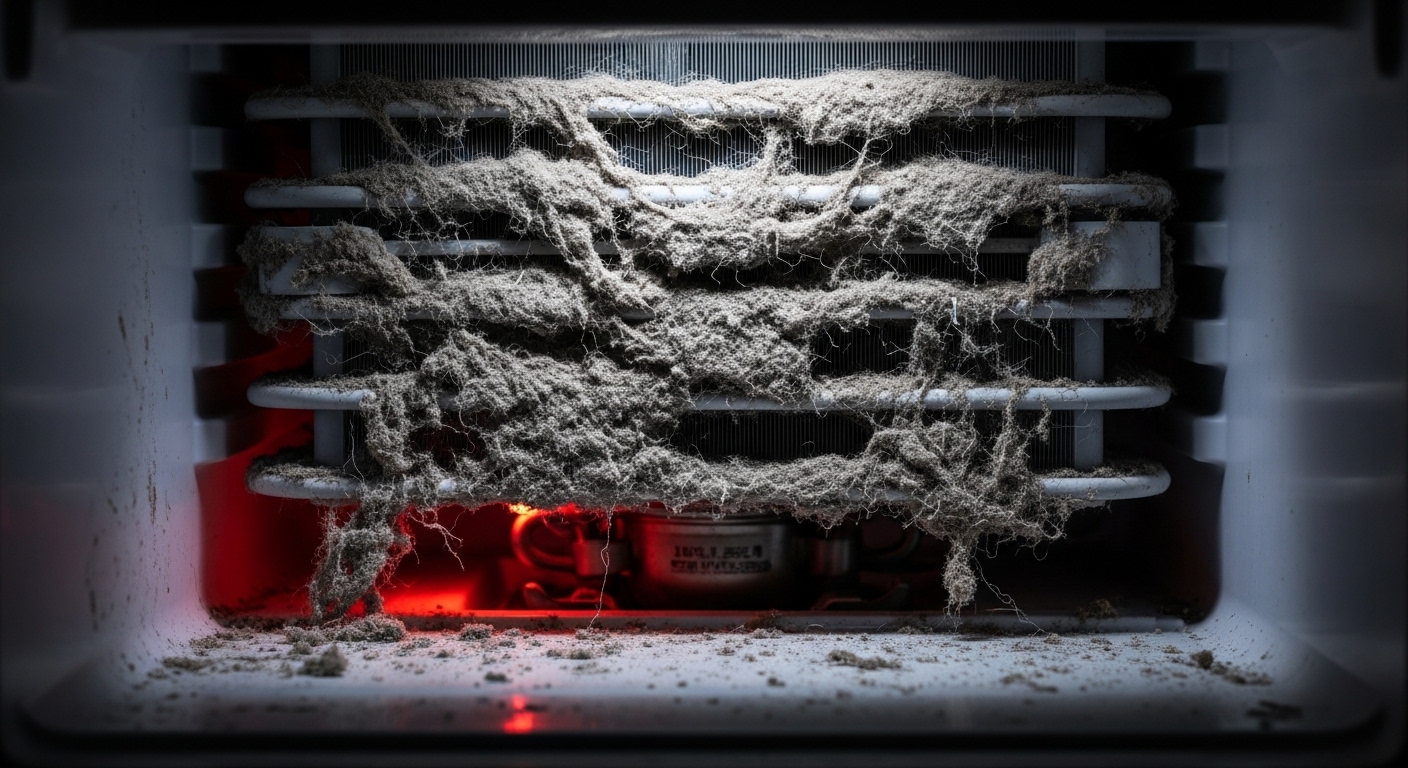
Moving from the theoretical understanding of appliance stress to practical reality, refrigerators represent the most critical appliance in any home during summer months because failure means potential food spoilage, food-borne illness risk, and significant financial loss. During normal operating conditions, refrigerators maintain internal temperatures between 37°F and 40°F through continuous but cycling compressor operation. The refrigerator door seals play a crucial role in this system, preventing warm exterior air from infiltrating the cooled interior space.
When summer heat peaks, several failure mechanisms can develop in refrigeration systems, each reducing the appliance’s ability to maintain safe food temperatures. The most common refrigeration failure during summer involves compressor overheating, a condition that develops when motors must run continuously without adequate cooling breaks. Signs of compressor distress include loud noises indicating mechanical strain, rapid food spoilage despite the appliance running, and noticeably increased energy consumption reflecting the extended operating cycles.
Some homeowners also report that their refrigerators feel warm or hot to the touch, particularly on the exterior surfaces where cooling coils are located. When a refrigerator compressor overheats, it may eventually trigger a safety shutdown mechanism that prevents permanent damage but leaves food unrefrigerated and at risk. This protective shutdown often occurs during the hottest part of the day when families most need refrigeration capacity.
Poor air circulation represents another critical failure mechanism affecting refrigerators during summer months. The condenser coils, which release heat absorbed from the refrigerator’s interior, must have adequate airflow to function properly. Dust, pet dander, and debris accumulate on these coils throughout the year, but summer’s continuous operation means these deposits restrict heat dissipation significantly. Additionally, many homeowners position refrigerators too close to walls or in areas with poor ventilation, preventing the crucial airflow necessary for heat rejection.
Without proper clearance—typically requiring at least 2-3 inches from the back and sides of the appliance—refrigerators cannot shed the heat generated during their operation. This problem becomes particularly acute when refrigerators are installed in kitchens with limited ventilation or placed in closed rooms where hot air becomes trapped. The result is a vicious cycle where reduced heat dissipation forces longer compressor operation, which generates more heat, further compromising the system’s ability to cool effectively.
Air Conditioning Systems Under Extreme Load
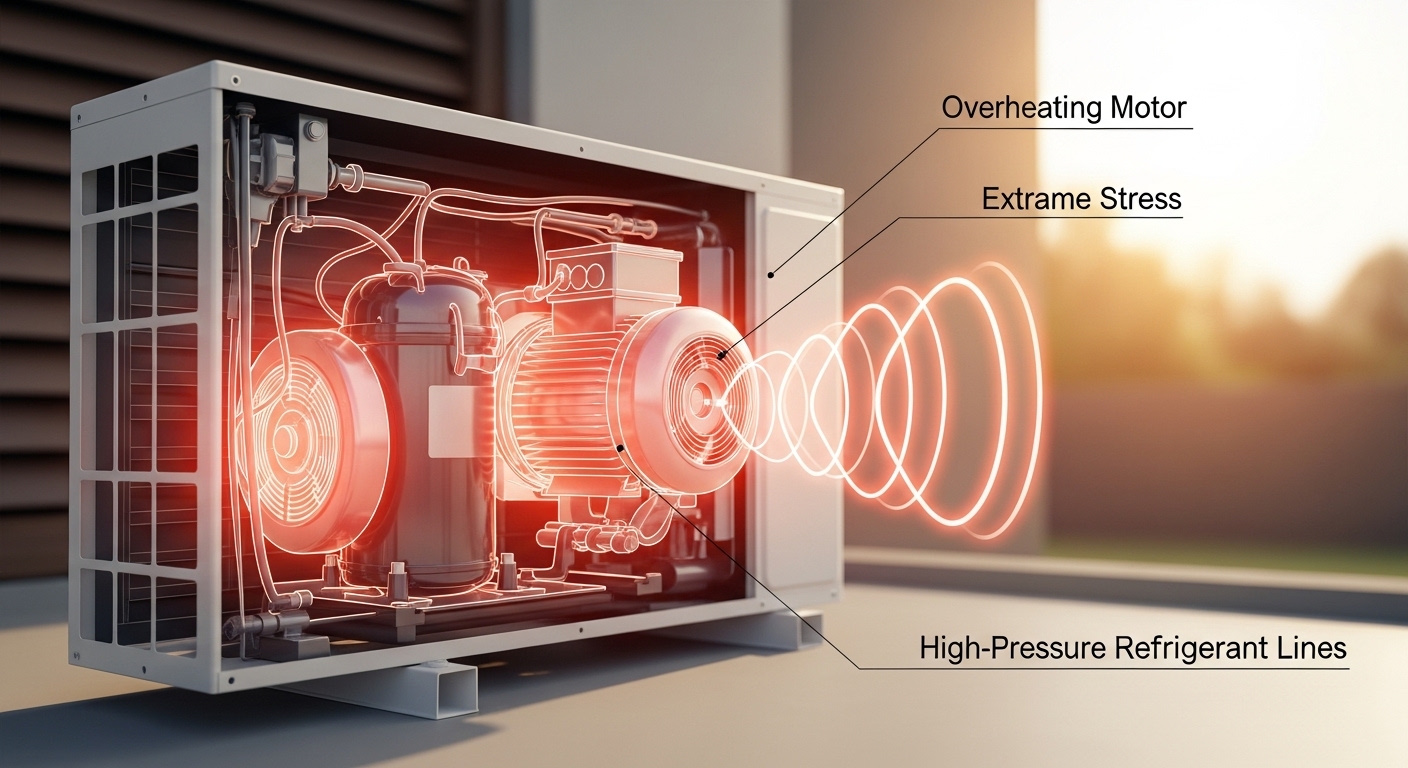
Understanding the distinction between overworked air conditioning systems and actually failing ones becomes critical for Chiliwack homeowners during summer heat waves. Air conditioning systems represent the largest energy consumer in homes during summer months, accounting for a substantial portion of household electricity use. When temperatures soar into the high 30s or beyond, air conditioning systems experience stress that tests their design limits, but this stress doesn’t necessarily indicate system failure.
According to HVAC experts, it is completely normal for air conditioners to run almost non-stop during extreme heat. An AC system running constantly during extreme temperatures is not necessarily broken; rather, it is doing its job by attempting to maintain the thermostat setting against external conditions that constantly attempt to warm your home. The key distinction lies in whether the system achieves its intended cooling despite the continuous operation.
However, several conditions indicate that your AC system is not just overworking but actually failing or operating inefficiently. If your air conditioning runs continuously but your home still feels warm, this signals a problem requiring professional attention. Common culprits include dirty air filters that restrict airflow to the system’s evaporator coils, dirty condenser coils that prevent heat rejection from the exterior unit, and refrigerant leaks that leave insufficient cooling fluid in circulation.
Each of these conditions forces the compressor to work harder than necessary while still failing to achieve adequate cooling. Frozen evaporator coils present another significant AC failure mode during summer, somewhat counterintuitively developing despite external heat. This occurs when reduced airflow through clogged filters causes cold air to linger on the coils long enough to freeze the condensation normally present on these components.
As ice builds up, it insulates the coils, preventing them from absorbing heat from the room’s air and further reducing cooling efficiency.
Proactive Maintenance and Strategic Usage Tips

To mitigate the risk of appliance failure during Chiliwack’s intense summer heat, homeowners can adopt several proactive maintenance strategies and adjust their appliance usage habits. These steps not only extend the life of your appliances but also improve their efficiency, leading to lower energy bills during peak season.
- Clean Condenser Coils Regularly: For both refrigerators and air conditioning units, clean condenser coils are essential for efficient heat dissipation. Unplug the appliance, locate the coils (typically on the back or bottom of a refrigerator and on the exterior AC unit), and use a vacuum with a brush attachment to remove dust and debris. This simple task can improve efficiency by 10-15%.
- Ensure Proper Airflow: Check that your refrigerator has at least 2-3 inches of clearance on all sides, especially the back, to allow for adequate air circulation. For central air conditioning, ensure the outdoor unit is free from obstructions like overgrown plants or debris that could block airflow.
- Replace Air Filters: For central air conditioning systems, replace your air filters every 1-3 months, especially during summer when the system runs frequently. A clogged filter restricts airflow, forcing the system to work harder and increasing the risk of the evaporator coil freezing.
- Strategic Thermostat Management: Instead of making drastic temperature changes, set your thermostat to a reasonable temperature (e.g., 24-25°C) and leave it there. Forcing the AC to cool a very hot house by 10 degrees at once puts immense strain on the system. Consider using a smart thermostat to pre-cool the house during cooler morning hours.
- Reduce Heat Load in Your Home: During the hottest parts of the day, close blinds and curtains to block solar heat gain. Avoid using heat-generating appliances like ovens or clothes dryers during peak afternoon hours. Cook outdoors on a grill or use a microwave instead.
- Check Refrigerator Door Seals: Test your refrigerator’s door seals by closing the door on a piece of paper. If you can pull the paper out easily, the seals are worn and need to be replaced to prevent cool air from escaping.
Frequently Asked Questions (FAQs)
Why does my fridge run all the time in the summer?
During hot weather, your refrigerator’s compressor must run more frequently and for longer periods to maintain its internal temperature against the higher ambient temperature of your home. This is normal behavior, especially during a heat wave. However, if it’s accompanied by food not staying cold, it may indicate a problem like dirty condenser coils or a failing compressor.
Is it normal for my air conditioner to run non-stop on a hot day?
Yes, on extremely hot days, especially in the Fraser Valley’s climate, it is normal for an AC unit to run continuously to maintain the set temperature. The system is working at maximum capacity to combat the high external heat load. It becomes a concern only if the house isn’t getting cooler despite the constant operation.
How can I reduce the strain on my appliances during a heat wave?
Reduce the heat load inside your home by closing blinds, using fans to circulate air, and avoiding using the oven. For your refrigerator, ensure it has proper ventilation, clean the coils, and try not to open the door too frequently. For your AC, ensure filters are clean and the outside unit is clear of debris.
What is the most common appliance failure in summer?
Compressor failure is one of the most common and expensive failures for both refrigerators and air conditioners during the summer. The continuous operation and high temperatures put immense stress on the compressor motor, leading to overheating and burnout.
Wrapping Up
For homeowners in Chiliwack and the surrounding Fraser Valley, understanding the immense strain that summer heat waves place on cooling appliances is the first step toward preventing costly breakdowns. The unique climate of the region, characterized by intense and often sudden heat, pushes refrigerators and air conditioning systems to their operational limits. By implementing simple yet effective maintenance routines, such as cleaning condenser coils and ensuring proper airflow, and adopting strategic usage habits, you can significantly reduce the risk of appliance failure. While it’s normal for these systems to work harder and run longer during peak heat, recognizing the signs of genuine malfunction—such as a failure to cool despite continuous operation—is crucial. Proactive care not only saves you from the expense and inconvenience of emergency repairs but also ensures your home remains a cool and safe refuge during the hottest days of the year.
 (604) 305-2992
(604) 305-2992 
 Schedule An Appointment
Schedule An Appointment 
